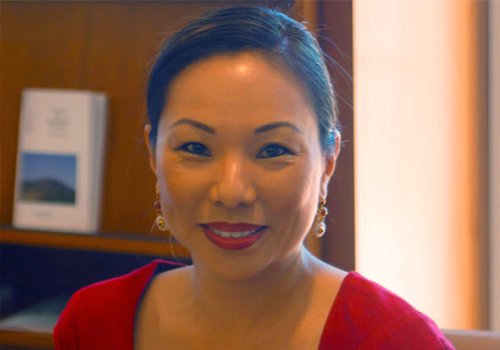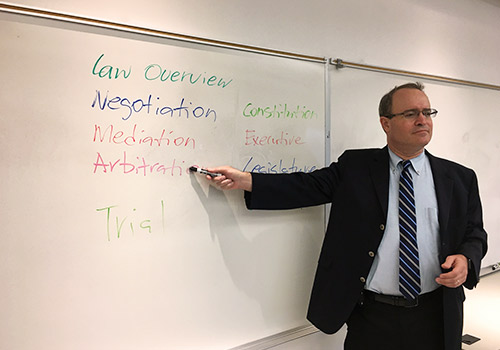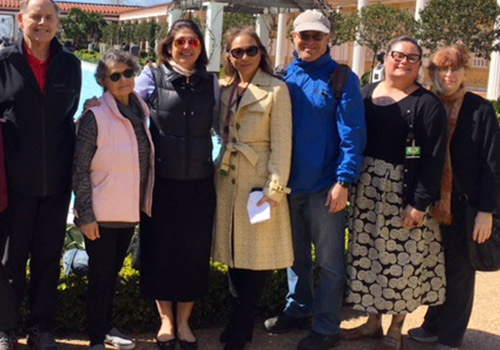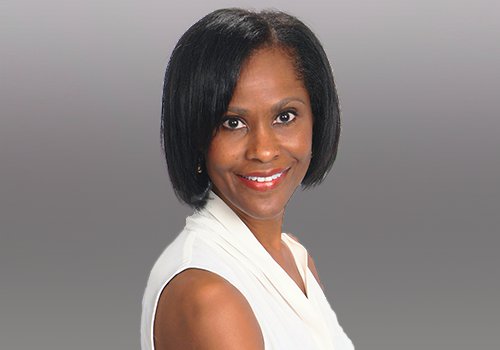Sound Bites - Issue #69 - May 2019 #310

Issue #69 May | 2019
Community Education's Premiere Online Magazine
On the Cover
Preparing for Greater Challenges in Real Estate
 Mina Mobasser
Mina Mobasser
 Mina Mobasser and family
Mina Mobasser and family
Mina Mobasser is a perfect example of an Angeleno who wants to advance in her career and has found that SMC Community Ed fits her needs exactly.
Mobasser – a high-energy, ambitious SMC alumna who has spent virtually her entire career in property management – is currently taking the three Real Estate courses at Community Ed in preparation to take the state real estate license exam.
"Taking these classes is an investment in myself, my career and my future," she says.
A general manager at a Moss & Company 91-unit Short Term Corporate Housing property in Westwood, Mobasser says she wants to grow and advance at Moss, which requires candidates hold a real estate license for certain positions. Moss & Company, based in Sherman Oaks, manages approximately 20,000 extended stay apartment units in Los Angeles County and employs more than 300 people.
She says she loves her work and has proven herself to be expert at handling the day-to-day challenges of property management, which can range from leading a crew and staff to housing terminally ill patients to hosting elite international clientele and construction projects.
But she says she is ready for greater challenges and opportunities.
She began the three 15-week courses at Community Ed – Real Estate Principles, Practice and Finance – in mid-February and will complete them in early June. The schedule is demanding, even grueling. She is in class from 6:30 to 9:30 Monday, Wednesday and Thursday nights. On top of that, she typically works 45-hour weeks and still manages to raise an 8-year-old son and 4-year-old daughter with her husband Sean, who also works for Moss & Company.
"The courses are intense," she says. "I'm grateful SMC offers them because, for one thing, SMC is my old stomping grounds. And I really, really appreciate that the classes are offered in person. I don't have the luxury of uninterrupted time to do online courses, whether at my work place or at home with two young children because of all the interruptions that would occur.
"So, for me," she continues, "it's vital to disconnect from everything else, walk into the classroom at a designated time and focus on the class."
Mobasser also says that the SMC courses are accredited and affordable and that the instructors provide the right balance of experience in the field and book learning. "For all you guys wanting to enroll next semester," she says, "definitely sign up for John Anderson's courses, he is great!"
"Mina's story is the story of a lot of people in Los Angeles who want to advance in their careers and who are dealing with issues such as the rapidly rising cost of housing in L.A.," says Alice Meyering, Program Coordinator of Community & Contract Education. "Professional development has become increasingly important."
Mobasser says both she and her husband plan to devote their entire careers to Moss and Company.
But taking the real estate courses, and ultimately getting her license, is a means to an end within the structure of her company.
"It is such a satisfaction, such a pleasure and mostly so exciting to feel that I am useful the company and that my performance, production and actions make a difference," she says. "Overseeing an Extended Stay operation of this caliber on a monthly basis ‘at hand level' triggers my professional adrenaline to a whole new level."
Check our Fall schedule when it is released in July for future Real Estate classes.

What's New
5th Annual Photo Contest – Make Your Vote Count

 Zaslove - Sand Painting
Zaslove - Sand Painting
 Laurie McCormick - Cuban Cool
Laurie McCormick - Cuban Cool
 Frank Damon - I Dare You to Touch Me
Frank Damon - I Dare You to Touch Me
from the desk of Alice Meyering
We're excited to announce the three finalists for our Fifth Annual Student Photo Contest – and YOU get the opportunity to choose the winner by voting at this link:
Voting continues until 11:30 PM on Wednesday, June 5, with the winner and runners-up announced shortly thereafter.
We are thrilled to have received a record number of submissions this year – 207, up by one-third compared to the 150 in 2018. We thank all 50 participants for sharing with us their best visions in their worlds. As we launch into public voting for the winning photo, we ask our faithful readers to make this a blowout year for us in participating in the voting process and let us know what you would like to see on our Fall 2019 brochure cover.
Aside from gracing the cover of our Fall 2019 Class Schedule, the winning image will be featured on social media and our marketing and public relations materials.
The top three images are, in no particular order, "Cuban Cool" by Laurie McCormick, "I Dare You To Touch Me!" by Frank Damon, and "Sand Painting" by Mara Zaslove.
Voting on the submissions went through two panels of judges to reach the Top 3. And because of both the quantity and quality of these wonderful photos, it was a very difficult task. But we believe that our community's participation in selecting the winner and two runners-up is the most important element of the Photo Contest and, as always, the support and participation of our public has been the greatest motivation for our program. Thank you so much and please show your love for us by going to this link and vote!
Follow us on Facebook, Twitter and other social media outlets for the latest on our contest and other news. For questions on the voting process, please do not hesitate to contact us at commed@smc.edu.

Behind the Scenes:
Legal Aspects of Business – All in the Small Print
 Robert Klepa
Robert Klepa
 Robert (3rd from right) with other Community Ed instructors on a private tour of the Getty Villa
Robert (3rd from right) with other Community Ed instructors on a private tour of the Getty Villa
Robert Klepa is a familiar face at SMC – as an advisor at the now-shuttered Small Business Development Center and as the instructor of the popular Basic Mediation Skills Training and Certificate at Community Ed. And now he is offering a new course, Legal Aspects of Business, starting July 18.
Klepa has extensive experience in the law on many different levels. Klepa has been a California licensed attorney for the last 27 years. In that time he has served multiple times as a Mediator, Arbitrator and Judge Pro Tem for the Los Angeles County Superior Court and decided or helped resolve various breach of contract, personal injury, and product liability cases. In addition, he has rendered decisions on hundreds of disability, housing, and employment law claims as a Hearing Officer for Los Angeles and Ventura Counties. Prior to undertaking his work as Mediator, Arbitrator and Hearing Officer, he worked for almost a decade as an advocate for individual, corporate and municipal clients, in negotiating resolutions to the various disputes in which they were involved.
Why are you offering Legal Aspects of Business?
I saw a need in the community for these courses. Contracts, Intellectual Property (copyright, trademark and patent), how the small claims court works and the good and bad of different types of business forms (e.g., corporation, sole proprietorships, partnerships and LLC's) are all areas that unnecessarily confuse and intimidate people.
Over and over again, I would be asked by clients the same basic contract questions: What is a contract, how do I make one, are magic words needed to make it enforceable, does it have to be in writing. Similarly, I would be asked about whether a business should be a corporation or an LLC, or whether it should remain a sole proprietorship or partnership?
Alternatively, they would ask what they needed to do to keep their corporation or LLC legally compliant. I would also inevitably be asked about a business name, a business creation like a story, or a business idea like a process, and be asked how to prevent others from using it. I would then have to explain the details of trademark (name protection), copyright (story protection) and patent (process or invention protection). Finally, I would be asked what to do if a contract or other deal went bad and the client needed to collect an amount from a customer, but it was too small an amount to justify hiring an attorney? My inevitable answer: Small claims court.
The courses I am teaching are not new to me or SMC. I taught them for many years to small business owners through the SMC Small Business Development Center before that center closed. In thinking about it after the center closed, I realized that the need was still there and thought it would be useful to pass on these same lessons to the general public through generalized classes.
The reality of this need was brought home to me a few weeks ago when I taught a contracts course through the Santa Monica Parks Department and had so many students come with such eager questions about how to handle car buying, apartment leasing, employment agreements and other contract issues that they were dealing with in their lives. All of this experience taught me that these classes are really needed and that SMC would be a great place to teach them.
By taking your class, will your students be more likely to avoid having to hire an attorney in the future? Or is the class aimed more at preventing legal problems from occurring in the first place?
Both. If a student understands how contracts work, they will know how to write them in a way that will greatly lessen the need to go to court and fight about their meaning. Similarly, learning whether their business should remain a sole proprietorship or a partnership, change to a corporation or LLC, the good and bad of making this change, and how to maintain a corporation or LLC if they choose to form one, will save them money by keeping them from having to hire an attorney to explain the good and the bad of these actions to them.
Further, knowing what cases they can take to small claims court on their own (no attorneys are allowed in the initial trial there), will save them money in allowing them to solve their own problems. In addition, knowing what is involved in trademark, copyright and patent will help them understand the types of protections to seek for their company name, stories and inventions. In short, the classes are designed to save a student money both by preventing future problems and by helping them understand what problems in their life they can solve on their own instead of hiring an attorney to handle.
The class tackles four topics that seem as if they could be complicated for the layperson. How do you make it understandable and accessible?
I use everyday examples in all of my classes. For contracts, we talk about apartment leases, purchase agreements for products like cars, employment agreements and similar items that students have seen before. The difference is that I explain the details to them so they understand what they are signing, instead of having to trust the writer's good intentions in creating the document. For small claims court, I take the student through the process step by step. Having worked as a small claims court judge, advocated for myself in small claims court cases, and helped friends prepare for their small claims court cases, I have a pretty good understanding of how to bring a case as effectively as possible. In regards to corporate formation and finance, I look at the existing forms that everyone has (sole proprietorships and partnerships) and compare the good and the bad of those forms with corporations and LLC's.
We talk about using insurance to protect yourself in place of or in addition to a corporation or LLC and what the good and the bad is in filing in Nevada or another state in place of California. Lastly, in talking about trademark, copyright and patent, we go over the uses of each area of law and what they protect, as well as how likely it would be for someone seeking those protections to need an attorney to help them (e.g. trademark=least likely, copyright=possibly, and patent=absolutely).
Most importantly, I am incorporating lessons learned from teaching these classes to small business owners in every type of business over many years. In those prior classes, I had to focus my efforts on giving the students the most important points in the most user-friendly fashion, so that they could use that information the next day in their business. I would use the same focus in these classes.
What do you find rewarding about teaching?
Teaching's a blast. I end up learning more teaching a class than I knew going in because students ask good questions and make me think in ways I hadn't before about certain issues. I also like meeting the engaged, interested and (for the most part) prepared people who I am lucky enough to have as students. They want to know the material so that, in many cases, they can use it the next day in their jobs or their personal lives.
Is there anything you'd like to add?
I like to teach at SMC Community Ed because the students want to learn and the staff support I receive is wonderful. My students are either looking to change careers or to use what I teach the next day in their businesses or lives. Knowing I will have this type of student and be so well supported by the staff in the classes I teach makes it very rewarding to teach at SMC Community Ed. I hope to keep teaching such classes through this program for many years to come.

Perspectives:
What New Classes Would Inspire You?
 Michelle King, Director Career & Contract Ed.
Michelle King, Director Career & Contract Ed.



The end of another school year is soon upon us. Many students are looking forward to graduating and moving on into a career and others are getting through finals while also preparing for the next term of courses.
Since SMC Community Ed/Extension is the not-for-credit arm of the college, the end of the school year is not so definitively marked for us. In fact, with the goal of engaging "Lifelong Learners," Community Ed operates counter to the concept of graduation as symbolic of completion. Our students are encouraged to explore and sample our wide variety of learning options indefinitely. There are no repeatability limitations – Community Ed/Extension students can repeat classes as many times as they desire.
This unique position of engaging in a long-term relationship with our students and the community means that we have to consistently work at keeping our course offering interesting. In reviewing some of the new courses that Community Ed/Extension offered over this past 2018-2019 school year, I'm feeling confident that we are meeting the mark on this part of our mission. Here is a sampling of some of the courses that were added during this past year:
Art & Jewelry Making
- Macramé Bracelet with Sliding Closure
Fashion Tech
- Sewing Machine Boot Camp
- Zipper Intensive
- Collar Sewing Boot Camp
Photography
- A Day in L.A with Your iPhone
- Advanced Digital Photographic Printing
- Adobe Photoshop for Photography – MAC
Fitness
Career and Professional Development
- Digital Sales and Marketing Certified Associate
- BlockChain Technology Training
- Legal Aspects of Business
If there are some particular courses or subject matters that you would like to see us offer during the 2019-2020 school year, please feel free to reach out to let us know your thoughts.
Warm regards,
Michelle King
Director of Career &
Contract Education
_______________________
Visit our award-winning website at http://commed.smc.edu to register for classes online 24/7. Follow us on Facebook, Twitter and other social media outlets for the latest news.

 Donate Today!
Donate Today!
